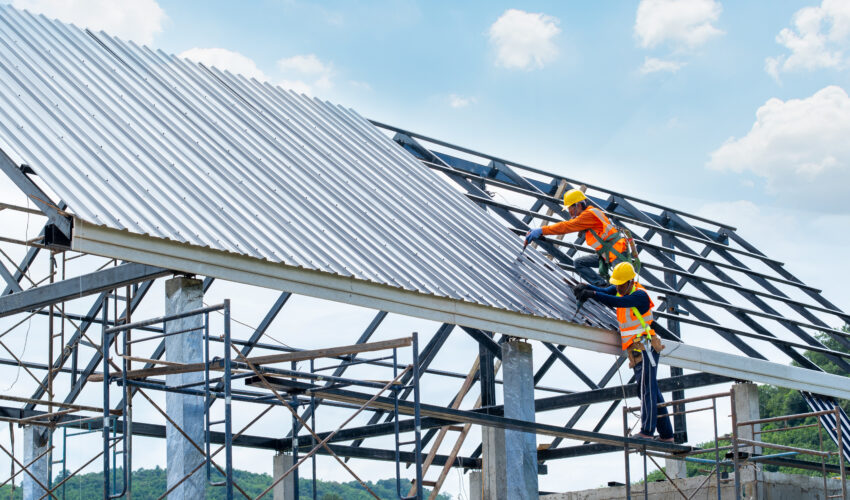Commercial roofing projects require careful planning, precision, and long-term vision. The scale and complexity of these projects go far beyond what’s involved in typical residential roofing. From assessing structural integrity to managing large crews and adhering to building codes, roofing contractors play a vital role in ensuring that every phase is executed correctly. A commercial roof must not only provide protection but also support energy efficiency, safety compliance, and durability. By coordinating materials, design, and installation methods, contractors ensure that businesses receive roofing systems capable of withstanding both time and environmental challenges while minimizing operational disruptions.
Understanding the Scope of Commercial Roofing Projects
Commercial roofing projects are typically larger, more intricate, and technically demanding than residential ones. Contractors must account for factors such as building size, roof slope, drainage systems, and insulation needs. The process often begins with a comprehensive inspection to determine the existing structure’s condition, followed by selecting materials suited to the property’s purpose—whether it’s a warehouse, office, or retail building. Unlike smaller projects, commercial roofing requires detailed coordination between architects, engineers, and property managers. Contractors ensure that every component, from underlayment to final coating, aligns with safety and performance standards. They also plan around business operations, scheduling work to minimize downtime. This complex coordination reflects their role not only as installers but also as project managers who bring order and efficiency to demanding construction environments. Their oversight ensures seamless execution from design to completion.
Coordination and Project Management Responsibilities
Roofing contractors serve as the central link between multiple stakeholders involved in a commercial project. Their duties extend beyond installation to include project coordination, budgeting, and timeline management. They must align their teams with the client’s operational requirements, ensuring that the work progresses smoothly without interrupting business activities. Contractors also manage subcontractors, safety personnel, and material suppliers to keep progress on track. They handle permits and compliance paperwork to meet municipal and federal building regulations. Effective project management minimizes risk, controls costs, and prevents delays that could affect productivity or profitability. In regions known for rapid commercial growth, roofing companies in Kansas City have demonstrated how strategic planning and professional coordination can transform complex roofing tasks into efficient, well-structured operations. Their ability to anticipate challenges, communicate effectively, and maintain high construction standards ensures that every project runs smoothly from preparation through final inspection.
Selecting the Right Roofing Systems for Commercial Needs
One of the most crucial decisions in commercial roofing involves selecting the proper materials and design system for each building. Contractors assess factors such as weather conditions, roof accessibility, and long-term maintenance requirements before recommending a solution. Flat roofs, for instance, often require materials like TPO, EPDM, or modified bitumen due to their water-resistant properties and ease of maintenance. Meanwhile, sloped or architectural roofs might benefit from metal or composite panels that combine durability with aesthetic appeal. Contractors ensure that chosen materials meet performance expectations and fit within the client’s budget. They also consider insulation and ventilation needs to enhance energy efficiency and reduce operational costs. This balance of practicality, cost-effectiveness, and sustainability underscores the contractor’s role as an advisor who translates technical data into tangible, long-lasting solutions for commercial property owners. Their decisions directly influence both the roof’s performance and the building’s overall energy efficiency.
Ensuring Safety and Regulatory Compliance
Safety is a central concern in all roofing projects, but it becomes even more critical in commercial environments where large-scale work involves multiple workers, heavy equipment, and elevated platforms. Roofing contractors enforce strict safety standards to protect both workers and occupants. They conduct regular safety briefings, use fall protection systems, and adhere to OSHA regulations throughout the project. Compliance with local building codes is also vital. Contractors ensure that all materials and installation methods meet these legal standards, which helps avoid penalties or costly future repairs.
Additionally, they secure the necessary permits and inspections to validate that the project aligns with environmental and structural guidelines. A well-managed commercial roofing operation reflects professionalism and attention to detail, ensuring the safety of everyone involved. This disciplined approach minimizes workplace hazards, reduces liability risks, and maintains a secure environment for both workers and building occupants during every phase of the roofing process.
Maintenance and Long-Term Performance Planning
The role of a roofing contractor doesn’t end once installation is complete. For commercial buildings, maintenance and long-term care are crucial for protecting the investment. Contractors often establish maintenance schedules that include periodic inspections, cleaning, and repair of minor issues before they escalate. They monitor for potential problems such as water pooling, membrane wear, or flashing damage. Through regular upkeep, contractors help extend the roof’s lifespan and preserve warranty coverage. Many also offer preventive maintenance programs tailored to specific roofing systems, providing peace of mind for property owners. By identifying issues early, contractors save businesses from unexpected downtime and expensive emergency repairs. Long-term maintenance planning is not merely about repair—it’s about sustaining the structural integrity and energy performance of the entire building. A roof maintained by experienced professionals can last decades longer, proving that ongoing collaboration between contractors and property owners is key to operational reliability.
Energy Efficiency and Environmental Considerations
Modern roofing contractors play a significant role in advancing sustainability in commercial construction. Energy efficiency is no longer just an optional feature—it’s a fundamental expectation for businesses seeking to reduce costs and environmental impact. Contractors incorporate materials and designs that improve insulation and reflectivity, such as cool roofing systems that minimize heat absorption. They may also integrate solar panels or vegetative roof systems to enhance sustainability and energy independence. By staying informed about technological innovations, contractors ensure that their clients benefit from environmentally responsible solutions without sacrificing durability.
Additionally, proper insulation and ventilation reduce HVAC strain, contributing to lower energy bills and improved indoor comfort. Contractors act as advisors in balancing environmental goals with economic efficiency, helping businesses meet green building certifications and corporate sustainability standards. Through this modern approach, they redefine commercial roofing as a forward-thinking, eco-conscious component of overall property management.
Quality Assurance and Final Inspections
Before a commercial roofing project is finalized, contractors perform detailed quality checks to ensure that every element meets performance expectations. They verify seam seals, drainage functionality, insulation coverage, and fastener integrity. Quality assurance involves both visual inspection and technical testing, such as infrared moisture scans or adhesion tests. These final checks confirm that the roofing system will perform under real-world conditions and comply with warranty standards. Contractors also provide documentation outlining materials used, maintenance instructions, and warranty terms for future reference. This transparency ensures that building owners understand how to care for their roof properly after installation. The final inspection represents the culmination of the contractor’s responsibility—delivering a secure, efficient, and durable roofing system that fulfills the client’s requirements. Quality assurance protects not only the building but also the reputation of the contractor, reinforcing trust and professionalism in commercial construction relationships.
Roofing contractors serve as the foundation of every successful commercial roofing project, managing the complex balance between technical performance, safety, and client satisfaction. Their work encompasses planning, coordination, material selection, installation, and maintenance—each phase essential to ensuring lasting results. By adhering to industry standards and prioritizing communication, they deliver roofing systems built for durability and efficiency. From managing budgets to ensuring compliance with regulations, contractors play a central role in every aspect of commercial roofing. Their influence extends far beyond installation, shaping how businesses protect their investments and maintain energy-efficient, weather-resistant structures. Ultimately, the effectiveness of a commercial roofing system reflects the precision and dedication of the contractors behind it—professionals committed to turning complex challenges into reliable, enduring solutions for modern commercial spaces.







